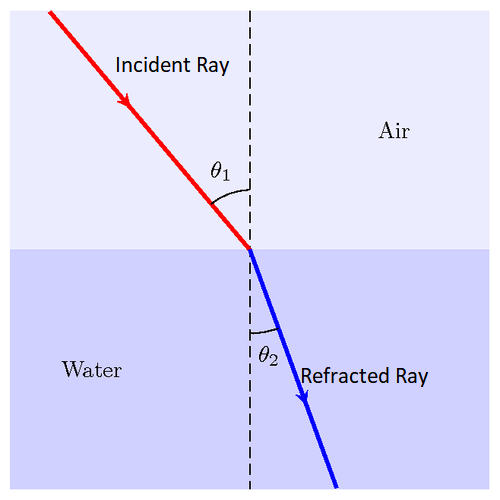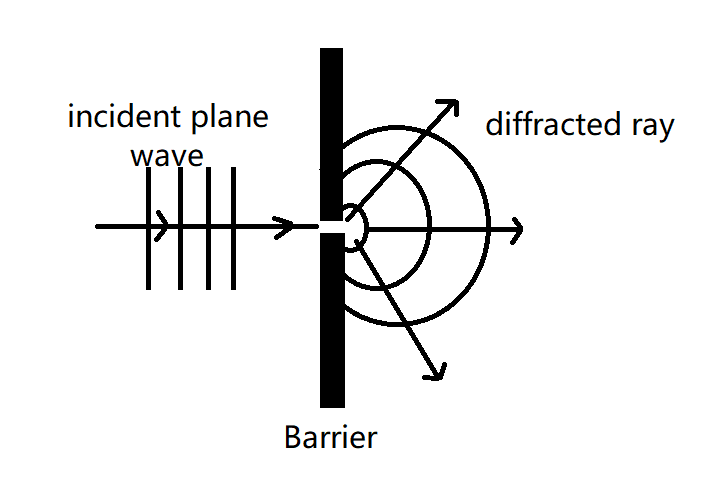
How does Reflection differ from Refraction and Diffraction?
Answer
555k+ views
Hint:Reflection occurs when light rays reflect back while Refraction occurs when Light travels through a medium (like Lens) and Diffraction is little bit different phenomena. In this light waves get spread in different directions because of some obstacle in the path.
Complete answer:
Reflection: In reflection, Incident or Incoming ray/wave gets reflected back without passing through the Object/medium. For example, a light is reflected from a mirror. The Law of Reflection is completely valid.
Law of Reflection States that when a light ray Reflects through a surface then, Angle of incidence is always equal to the Angle of Reflection
$\angle i=\angle r$
Where $\angle i$ is the angle of incidence and $\angle r$is the angle of Reflection.
Refraction: In Refraction, when a wave of light passes through a medium it changes its direction and this is known as Refraction. For example, a ray of light passing through a Lens/Water changes its direction and hence Refraction occurs in case of a light passing from Air to Water.
For Refraction We uses Snell’s Law ${{n}_{1}}\sin i={{n}_{2}}\sin r$
Where ${{n}_{1}}$ and ${{n}_{2}}$ are refractive index of medium
Diffraction: In diffraction, A light wave changes its direction and spreads in multiple directions when it passes through a barrier or a small Opening/hole. Diffraction is the reason behind the Interference of light. The most useful everyday example for Diffraction is Reddish appearance of Sun during the Sunset and the Appearance of Rainbow colors in a CD/DVD Drive.

Fig 1 Reflection of light

Fig 2 Refraction of light

Fig 3 Diffraction of light
Note:
There is no ideally Reflecting or Refracting surface/medium, so we can say that whenever there is a Refraction, there must be a reflection and vice versa. When a light way gets Reflected some amount of it may get absorbed or Refracted and hence there is no Perfect reflection and same applies for refraction, Whenever There is a Refraction, some amount of Light get Reflected back and hence we can say there is no perfect or ideal refraction exists in this World.
Complete answer:
Reflection: In reflection, Incident or Incoming ray/wave gets reflected back without passing through the Object/medium. For example, a light is reflected from a mirror. The Law of Reflection is completely valid.
Law of Reflection States that when a light ray Reflects through a surface then, Angle of incidence is always equal to the Angle of Reflection
$\angle i=\angle r$
Where $\angle i$ is the angle of incidence and $\angle r$is the angle of Reflection.
Refraction: In Refraction, when a wave of light passes through a medium it changes its direction and this is known as Refraction. For example, a ray of light passing through a Lens/Water changes its direction and hence Refraction occurs in case of a light passing from Air to Water.
For Refraction We uses Snell’s Law ${{n}_{1}}\sin i={{n}_{2}}\sin r$
Where ${{n}_{1}}$ and ${{n}_{2}}$ are refractive index of medium
Diffraction: In diffraction, A light wave changes its direction and spreads in multiple directions when it passes through a barrier or a small Opening/hole. Diffraction is the reason behind the Interference of light. The most useful everyday example for Diffraction is Reddish appearance of Sun during the Sunset and the Appearance of Rainbow colors in a CD/DVD Drive.

Fig 1 Reflection of light

Fig 2 Refraction of light

Fig 3 Diffraction of light
Note:
There is no ideally Reflecting or Refracting surface/medium, so we can say that whenever there is a Refraction, there must be a reflection and vice versa. When a light way gets Reflected some amount of it may get absorbed or Refracted and hence there is no Perfect reflection and same applies for refraction, Whenever There is a Refraction, some amount of Light get Reflected back and hence we can say there is no perfect or ideal refraction exists in this World.
Recently Updated Pages
Master Class 12 Economics: Engaging Questions & Answers for Success

Master Class 12 Physics: Engaging Questions & Answers for Success

Master Class 12 English: Engaging Questions & Answers for Success

Master Class 12 Social Science: Engaging Questions & Answers for Success

Master Class 12 Maths: Engaging Questions & Answers for Success

Master Class 12 Business Studies: Engaging Questions & Answers for Success

Trending doubts
Which are the Top 10 Largest Countries of the World?

What are the major means of transport Explain each class 12 social science CBSE

Draw a labelled sketch of the human eye class 12 physics CBSE

Why cannot DNA pass through cell membranes class 12 biology CBSE

Differentiate between insitu conservation and exsitu class 12 biology CBSE

Draw a neat and well labeled diagram of TS of ovary class 12 biology CBSE




